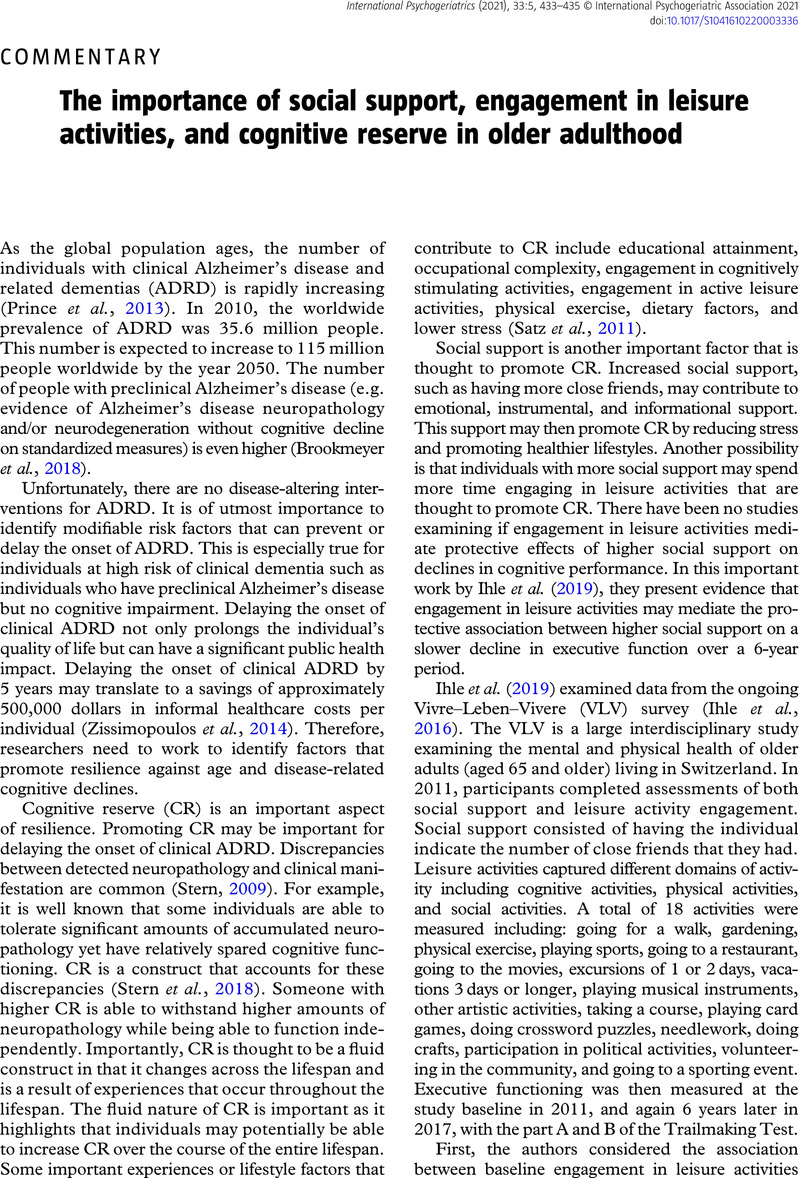Crossref Citations
This article has been cited by the following publications. This list is generated based on data provided by Crossref.
Brewster, Katharine K.
Deal, Jennifer A.
Lin, Frank R.
and
Rutherford, Bret R.
2022.
Considering hearing loss as a modifiable risk factor for dementia.
Expert Review of Neurotherapeutics,
Vol. 22,
Issue. 9,
p.
805.
Cotelli, Maria
Ferrari, Clarissa
Gobbi, Elena
Binetti, Giuliano
Manenti, Rosa
and
Sandrini, Marco
2022.
tDCS-Induced Memory Reconsolidation Effects: Analysis of Prominent Predicting Factors.
Frontiers in Neuroscience,
Vol. 16,
Issue. ,
TAKIGUCHI, Yuta
KIKUTANI, Mariko
and
MATSUI, Mie
2023.
EVALUATING POSITIVE EFFECTS OF LEISURE FROM A LIFE-COURSE PERSPECTIVE: A LITERATURE REVIEW.
PSYCHOLOGIA,
Vol. 65,
Issue. 1,
p.
35.
Sardella, Alberto
Lenzo, Vittorio
Basile, Giorgio
Martino, Gabriella
and
Quattropani, Maria C.
2023.
Emotion regulation strategies and difficulties in older adults: A systematic review.
Clinical Gerontologist,
Vol. 46,
Issue. 3,
p.
280.
Mitchell, J. J.
Hamer, M.
Blodgett, J. M.
Wannamethee, G. S.
and
Jefferis, B. J.
2023.
Associations between sporting physical activity and cognition in mid and later‐life: Evidence from two cohorts.
Scandinavian Journal of Medicine & Science in Sports,
Vol. 33,
Issue. 8,
p.
1570.
Nucci, Lorenzo
Miraglia, Francesca
Alù, Francesca
Pappalettera, Chiara
Judica, Elda
Manenti, Rosa
Rossini, Paolo Maria
and
Vecchio, Fabrizio
2023.
Reaction time and cognitive strategies: The role of education in task performance.
Learning and Motivation,
Vol. 82,
Issue. ,
p.
101884.
Wang, Dandan
Li, Xin
Dang, Mingxi
Zhao, Shaokun
Sang, Feng
and
Zhang, Zhanjun
2024.
Frontotemporal structure preservation underlies the protective effect of lifetime intellectual cognitive reserve on cognition in the elderly.
Alzheimer's Research & Therapy,
Vol. 16,
Issue. 1,
Lee, Joonyup
2024.
Social Exclusion Before and During the COVID-19 Pandemic: A Longitudinal Study of Older Adults in the United States.
Journal of the Society for Social Work and Research,
Vol. 15,
Issue. 1,
p.
27.
Feldberg, Carolina
Barreyro, Juan Pablo
Tartaglini, Maria Florencia
Hermida, Paula Daniela
Moya García, Lydia
Benetti, Laureana
Somale, María Verónica
and
Allegri, Ricardo
2024.
Estimation of cognitive reserve and its impact on cognitive performance in older adults.
Applied Neuropsychology: Adult,
Vol. 31,
Issue. 2,
p.
117.
Han, Xiaojuan
Li, Yuanjing
Wang, Jiafeng
Liu, Xinyu
Zhang, Yu
Dong, Qiwei
Song, Yiming
Cong, Lin
Zhang, Qinghua
Tang, Shi
Song, Lin
Hou, Tingting
Wang, Yongxiang
Du, Yifeng
and
Qiu, Chengxuan
2025.
Associations between lifelong cognitive reserve, Alzheimer's disease-related plasma biomarkers, and cognitive function in dementia-free older adults: A population-based study.
Journal of Alzheimer’s Disease,



